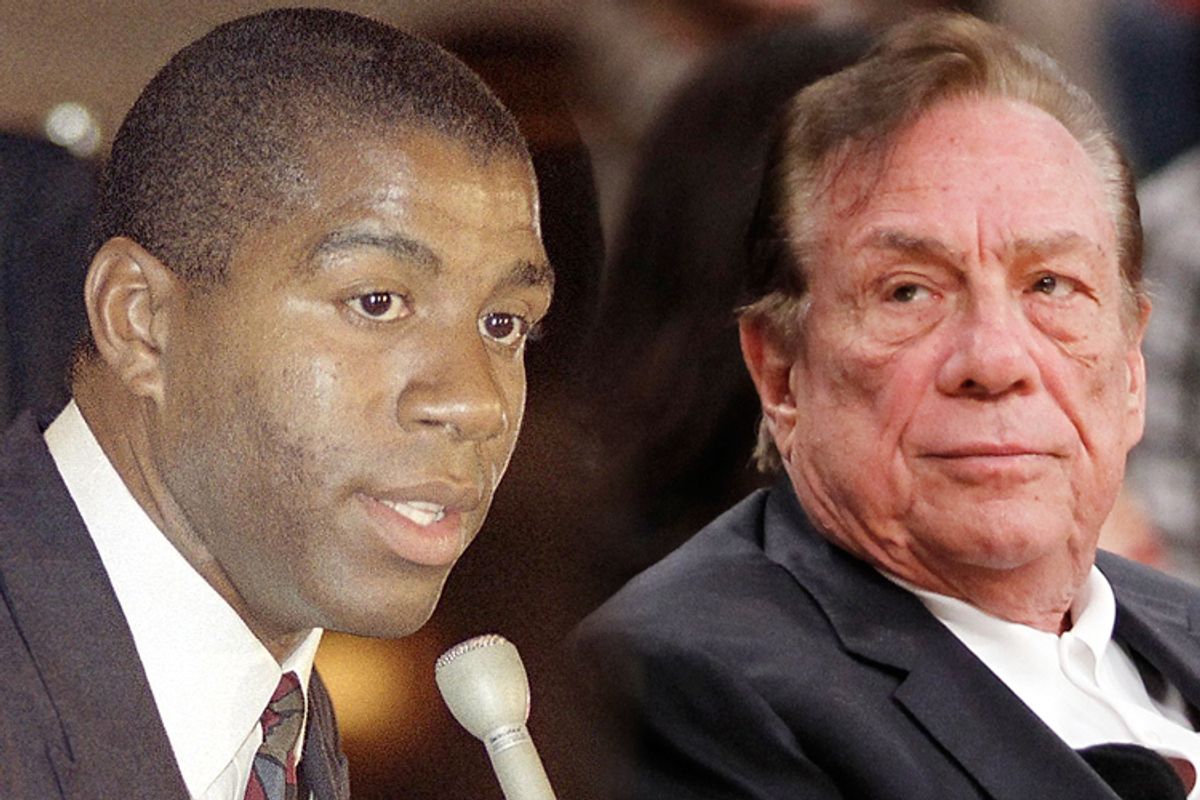As if to prove he can be ridiculous on multiple levels, Donald Sterling on Monday added "people with HIV" to his lengthy resume of groups he's singled out to offend. On Anderson Cooper's "360," the newly unemployed ex-owner of the Clippers railed against Magic Johnson, saying, "Here is a man who… acts so holy. He made love to every girl in every city in America and he had AIDS. And when he had those AIDS [sic] I went to my synagogue and I prayed for him. I hoped he could live and be well. I didn't criticize him. I could have. Is he an example for children? Because he has money he's able to treat himself." Moments later he asked, "What has he done, can you tell me? Big Magic Johnson, what has he done? He's got AIDS. Did he do any business? Did he help anyone in South LA?" Cooper quickly clarified, "Well, I think he has HIV. He doesn't actually have full-blown AIDS," but Sterling doubled down, asking, "Well, what kind of a guy goes to every city, has sex with every girl, then he catches HIV? Is that someone we want to respect and tell our kids about? I think he should be ashamed of himself. I think he should go into the background. But what does he do for the black people? He doesn't do anything."
You want to know what Magic Johnson has done, Donald Sterling? Sure, let's talk about that. I'm game, because I vividly remember the November day in 1991 when Johnson announced that he was HIV positive. I was working in a post-college grunt job, and the news that he was holding a press conference — undoubtedly to address recent rumors about his condition — spread like wildfire among the staff. Desk radios dials were quickly swerved to the local news station; this was, after all, still years before you could get breaking news via the Internet. "Because of the HIV virus that I have attained," Johnson said, "I will have to retire from the Lakers today. I just want to make clear that I do not have the AIDS disease… I plan on going on living for a long time, bugging you guys like I always have and going on with my life…. I will now become a spokesman for the HIV virus because I want young people to realize they can practice safe sex. Sometimes you're a little naïve about it and think it could never happen to you. You only thought it could happen to other people. But it has happened and I'm going to deal with it and my life will go on." This young man, this three time NBA MVP, was not just walking away from his basketball career; he was doing it because he had HIV. And when my coworkers and I heard the news, we all knew the same thing. Magic Johnson was going to die.
That was what people did then. Just two weeks after Johnson's announcement, Freddie Mercury would be dead of AIDS. In the US, AIDS deaths would continue to climb for another four years before leveling off. And for those of us who embarked on our sexual lives in the eighties, sex always carried with it the risk of death. A death that was gruesome and that marked you for judgment, because the peak era of the crisis was defined by a hierarchy of blame. At the bottom were people like Ryan White, a hemophiliac child who'd contracted AIDS via contaminated blood. These people were regularly referred to as the "innocent victims." At the top were gay men, whose health emergency was treated dismissively for years, and who then were frequently blamed and excoriated once the disease spread to the heterosexual community. And in the middle were straight people like Magic, unsure of the risk, afraid of the stigma.
What Johnson did that day in November was to bring HIV and AIDS to that middle. His coming out as a person with the virus helped change the public perception of what it meant to have it – and remarkably, what it would mean to live with it long-term. He went on to launch the Magic Johnson Foundation. He made it harder to marginalize and criticize people HIV; he offered hope of survival. Of course, the breakthroughs in treatment that followed in Johnson's wake have radically redefined what it means to live with HIV. But it was Johnson's unprecedented candor about his condition and his determination to take HIV awareness out of the margins that helped change the public conversation. That press conference will forever remain a watershed moment in public health, and for that, millions of us owe a debt of gratitude to Magic Johnson.
For those of us who can still recall the terror and heartbreak of seeing desiccated young men walking the streets of New York City, who remember what it was like to be young and to hope that our sexual experiences weren't going to kill us, Sterling's remarks Monday were quite the ride in the wayback machine. God knows it's not that sexual shaming has disappeared in the last 23 years, but it's been a while since I heard somebody cavalierly confuse HIV and AIDS, or suggest that having HIV was an unflattering commentary on the number of partners a person had been with, and ergo would make a person an unsuitable role model. I'm so glad that has changed. What's Magic Johnson done, you ask? He helped make garbage thinking like that considerably less commonplace. He helped my generation — and the generations that followed -- believe we were going to live, and that we had nothing be ashamed of. So the real question is, what'd you ever do, Donald Sterling?



Shares